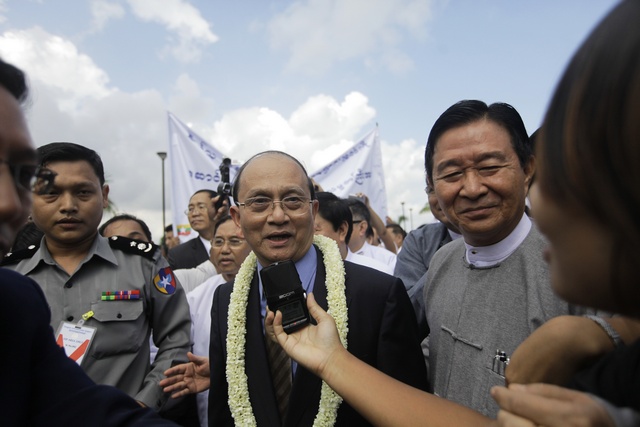If, by this time next year, he ends the Burma Army’s war on the Kachin people, stops the anti-Rohingya pogroms and repeals the 1982 Citizenship Law which rendered them stateless, turns the current precarious ceasefires into a genuine peace process involving a nationwide political dialogue with the ethnic nationalities about the country’s future political structure, and amends the constitution, President Thein Sein would deserve to be considered for the Nobel Peace Prize, and I personally would support his nomination.
The idea that he should be this year’s Laureate, however, is an entirely different matter. The Nobel Committee’s decision to award the prize to President Obama when he had barely been in office a few months and had not had a chance to achieve anything should serve as a warning against premature decisions. It made a laughing stock of the prize, insulted past Laureates and embarrassed President Obama himself. The same would be the case this year if the rumours turned to reality.
Thein Sein has taken some significant steps, to be sure, and deserves credit for changing the atmosphere in Burma in just one year. His relationship with Aung San Suu Kyi is reminiscent of FW de Klerk’s partnership with Nelson Mandela in South Africa. Thein Sein has released significant numbers of political prisoners, permitted prominent dissidents and civil society organisations unprecedented space to organise and mobilise, relaxed controls on the media and made it possible for the National League for Democracy (NLD) to contest by-elections and enter Parliament. He should be recognised and applauded for these steps, but he should also be left in no doubt: they must be just the beginning.
Any leader in a brutal regime who makes the brave decision, whatever their motivations, to reform should be encouraged and recognised. FW de Klerk, Mikhail Gorbachev and Indonesia’s BJ Habibie all helped set their countries on a path of greater freedom and openness, and without them we might still be living with communism, apartheid and corrupt authoritarianism in South Africa, Eastern Europe and Indonesia today.
Any person who decides to change course, whatever the motivation, should be welcomed. That’s why over the years, I have made a point of meeting defectors from the Burma Army, former radical Islamists who have become experts in counter-extremism and former North Korean prison guards. That’s why I went to the Maldives in 2006, to engage with reformers in the Gayoom regime, a dictatorship like any other. That’s why I travelled to Pyongyang, to talk to people in the North Korean regime who appear to want to begin to engage with the outside world. That’s why the British government decided to talk to Sinn Fein leaders who had previously backed terrorism in Northern Ireland.
When a person representing a brutal regime or a cruel ideology recognises that the cause they have defended is unsustainable, and democratic reform is the way forward, the door should not be shut in their face because they have blood on their hands. On the contrary, defectors are our allies because they have valuable knowledge and experience which they can use to challenge their former cause, and reformers are our allies if they are serious about changing course. And reformers who go the whole way and change a whole system deserve prizes.
[pullquote]“The changes he has overseen so far are primarily changes in atmosphere rather than changes in system”[/pullquote]
So, Thein Sein has taken some brave steps, which we should support. But they are initial, preliminary steps. The changes he has overseen so far are primarily changes in atmosphere rather than changes in system, and they are not yet irreversible. To give him the Nobel Peace Prize now would be not only premature and rather silly, but potentially dangerous. Receiving the prize this year could stall the process. With sanctions mostly lifted or suspended, a peace prize in his pocket and Aung San Suu Kyi in Parliament, what incentive would there be for Thein Sein to continue to reform, or for others in the regime to continue to back him?
It may well be difficult to reverse, but he may lose the will to accelerate. Furthermore, to give a prize for peace to a President whose military continues to kill, rape and torture civilians, causing hundreds of thousands to flee their homes, would be wrong.
So I hope the rumours are no more than that – but that they may propel Thein Sein to turn his positive rhetoric into lasting substance, and be worthy of the Nobel Peace Prize next year. If there is genuine peace in all parts of the country, moves towards national reconciliation, and progress on constitutional reform, then he should receive the prize, and I would be the first to say so. At that point, I would be the first to defend him against the cynics and sceptics. For now, I say there is much more to do before we reach that point.
-Benedict Rogers is Asia Team Leader at the international human rights organisation Christian Solidarity Worldwide and is the author of three books on Burma, including his new book “Burma: A Nation at the Crossroads” (Random House. June 2012).
– The opinions and views expressed in this piece are the author’s own and do not necessarily reflect DVB’s editorial policy.



